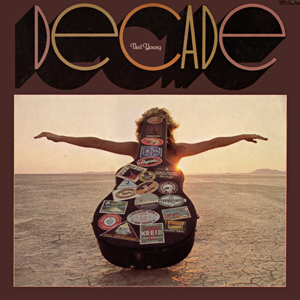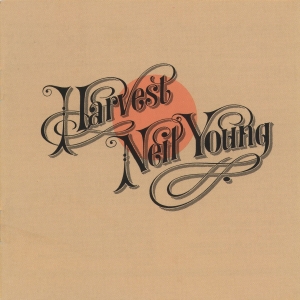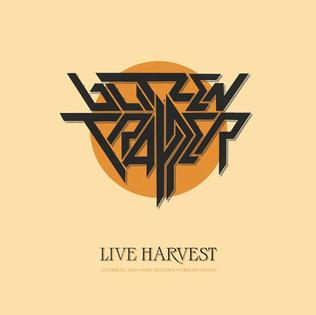
Decade is a compilation album by Canadian-American musician Neil Young, originally released in 1977 as a triple album and later issued on two compact discs. It contains 35 of Young's songs recorded between 1966 and 1976, among them five tracks that had been unreleased up to that point. It peaked at No. 43 on the Billboard Top Pop Albums chart, and was certified platinum by the RIAA in 1986.

Neil Percival Young is a Canadian-American singer and songwriter. After embarking on a music career in Winnipeg in the 1960s, Young moved to Los Angeles, joining the folk-rock group Buffalo Springfield. Since the beginning of his solo career, often with backing by the band Crazy Horse, he has released critically acclaimed albums such as Everybody Knows This Is Nowhere (1969), After the Gold Rush (1970), Harvest (1972), On the Beach (1974), and Rust Never Sleeps (1979). He was also a part-time member of Crosby, Stills, Nash & Young, with whom he recorded the chart-topping 1970 album Déjà Vu.

Harvest is the fourth studio album by Canadian-American musician Neil Young, released on February 1, 1972, by Reprise Records, catalogue number MS 2032. It featured the London Symphony Orchestra on two tracks and vocals by guests David Crosby, Graham Nash, Linda Ronstadt, Stephen Stills, and James Taylor. It topped the Billboard 200 album chart for two weeks, and spawned two hit singles, "Old Man", which peaked at No. 31 on the US Billboard Hot 100, and "Heart of Gold", which reached No. 1. It was the best-selling album of 1972 in the United States. The album has since remained Neil Young's signature album as well as his best selling.

Caroline Louise Snodgress was an American actress. She is best remembered for her role in the film Diary of a Mad Housewife (1970), for which she was nominated for an Academy Award and a BAFTA Award as well as winning two Golden Globes and two Laurel Awards.
The 36th Annual Grammy Awards were held on March 1, 1994. They recognized accomplishments by musicians from the previous year. Whitney Houston was the Big Winner winning 3 awards including Record of the Year and Album of the Year while opening the show with "I Will Always Love You".

Tonight's the Night is the sixth studio album by Canadian / American songwriter Neil Young. It was recorded in August–September 1973, mostly on August 26, but its release was delayed until June 1975. It peaked at No. 25 on the Billboard 200. In 2003, the album was ranked number 331 on Rolling Stone magazine's list of the 500 greatest albums of all time, moving up to number 330 in the list's 2012 edition and climbing further to number 302 in the 2020 update. The album is the third and final of the so-called "Ditch Trilogy" of albums that Young released following the major success of 1972's Harvest, whereupon the scope of his success and acclaim became so difficult for Young to handle that he subsequently experienced alienation from his music and career.
Danny Ray Whitten was an American guitarist and songwriter, best known for his work with Neil Young's backing band Crazy Horse, and for the song "I Don't Want to Talk About It", a hit for Rod Stewart and Everything but the Girl.

"Old Man" is a song written and performed by Canadian rock singer-songwriter and guitarist Neil Young from his 1972 album Harvest. "Old Man" was released as a single on Reprise Records in the spring of 1972, reaching number 4 in Canada, and number 31 on the Billboard Hot 100 singles chart for the week ending June 3.

"Heart of Gold" is a song by Canadian singer-songwriter Neil Young. From his fourth album Harvest, it is Young's only U.S. No. 1 single. In Canada, it reached No. 1 on the RPM national singles chart for the first time on April 8, 1972, on which date Young held the top spot on both the singles and albums charts. Billboard ranked it as the No. 17 song for 1972. In 2004, Rolling Stone ranked it No. 297 on their list of the 500 greatest songs of all time, No. 303 in an updated 2010 list, and No. 259 in 2021.

Borrowed Tunes is a tribute album to Neil Young, released in 1994. The album was released as a two-CD set, one compiling acoustic songs and one compiling rock-oriented ones, although the two discs were also each sold individually. The album features a variety of Canadian musicians covering songs written by Neil Young. All profits from the album were donated to The Bridge School, which develops and uses advanced technologies to aid in the instruction of handicapped children. A second album called Borrowed Tunes II: A Tribute to Neil Young was released in 2007.
"Don't Let It Bring You Down" is the seventh track on Neil Young's 1970 studio album After the Gold Rush.

Live at Massey Hall 1971 is a live album by Canadian musician Neil Young. Released in 2007, the album features a solo, acoustic performance from Massey Hall in Toronto, Ontario, Canada on 19 January 1971 during the Journey Through the Past Solo Tour. It is the second release in Young's Archives Performance Series. It reached #1 in Canada with 11,000 units sold in its first week. It debuted at #9 on the Irish Charts, and #30 on the UK albums chart.
A Man Needs a Maid may refer to:

Neil Young Archives Vol. 1: 1963–1972 is the first in a planned series of box sets of archival material by Canadian-American musician Neil Young. It was released on June 2, 2009, in three different formats - a set of 10 Blu-ray discs in order to present high resolution audio as well as accompanying visual documentation, a set of 10 DVDs and a more basic 8-CD set. Covering Young's early years with The Squires and Buffalo Springfield, it also includes various demos, outtakes and alternate versions of songs from his albums Neil Young, Everybody Knows This Is Nowhere, After the Gold Rush, and Harvest, as well as tracks he recorded with Crazy Horse and Crosby, Stills, Nash & Young during this time. Also included in the set are several live discs, as well as a copy of the long out-of-print film Journey Through the Past, directed by Young in the early 1970s.

The Broadway is a performance venue in Barking town centre. The building was previously a facility known as Barking Assembly Hall, forming part of Barking Town Hall.

Dala is a Canadian acoustic-folk two-piece musical group, made up by Sheila Carabine and Amanda Walther, both of Scarborough, Ontario.
"A Man Needs a Maid" is a song written by Neil Young that was first released on his 1972 album Harvest. It is one of two songs on Harvest on which Young is accompanied by the London Symphony Orchestra. It has appeared on several of Young's live and compilation albums.

On April 18, 2015, Blitzen Trapper released Live Harvest for Record Store Day. Recorded on October 17 at the Doug Fir Lounge in Portland, Oregon at the end of the band's VII tour, Live Harvest is a song-for-song interpretation of Neil Young's 1972 album Harvest. The album was released as a 180 gram vinyl LP with a download card. The band launched a short tour in support of the record, including stops at several City Winery locations in New York, Nashville, and Chicago, in which they played Harvest in its entirety, as well as Blitzen Trapper songs.
"Harvest" is a song written by Neil Young that was the title song of his 1972 album Harvest.

Young Shakespeare is a live album and concert film from Canadian folk rock musician Neil Young recorded in 1971, and released on March 26, 2021. Recorded three days after Live at Massey Hall 1971, during the Journey Through the Past Solo Tour.














